50 years of MARPOL Conference. The law does not keep up with the developing sea transport
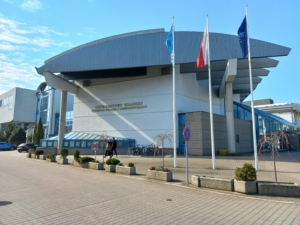
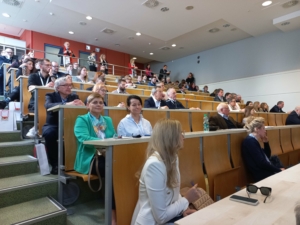
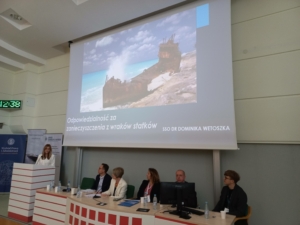
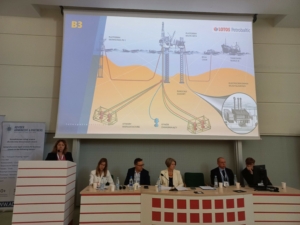
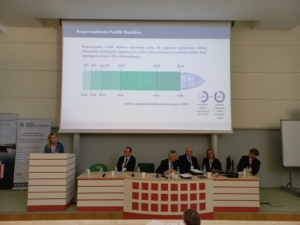
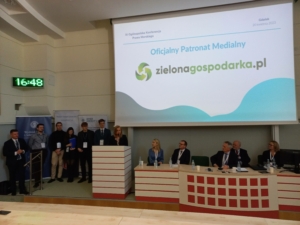
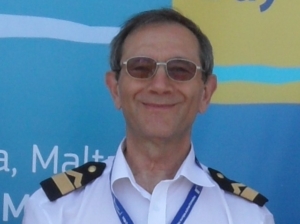 By Marek Grzybowski
By Marek Grzybowski
The 11th National Maritime Law Conference focused on the problem of preventing marine pollution by ships in the context of the 50 years of MARPOL – a convention that is still modified, but does not take into account many new threats and is still supplemented with new regulations. The April 2023 conference was attended by representatives of science and business, insurance companies and law firms, which greatly enriched the discussion and raised its temperature many times during thematic panels.
Speech entitled “The European Union as a precursor of pro-ecological legal solutions in the field of reducing greenhouse gas emissions” was an excellent introduction to the discussion in thematic panels of the conference. Member of the European Parliament, Dr. Magdalena Adamowicz, drew attention to the high activity of European Union institutions in creating guidelines and strategies for the green deal and achieving climate neutrality by 2050.
The Fit For 55 package resulted in proposals for specific solutions. Regulations of the European Parliament and of the Council on the use of renewable and low-emission fuels in maritime transport and amending Directive 2009/16/EC, as well as the development of alternative fuels infrastructure and repealing Directive 2014/94/EU of the European Parliament and of the Council have been published.
More photos: 11th National Maritime Law Conference OficynaMorska.pl
The law is ineffective
Already the first panel on the prevention of marine pollution raised many doubts as to the effectiveness of international regulations. It was efficiently led by prof. dr hab. Andrzej Makowski (AMW), and an extensive introduction by Professor Dorota Pyć (Head of the Department of Maritime Law of the University of Gdańsk) provided the basis for further presentation of various views on the effectiveness of legal and organizational solutions aimed at preventing sea pollution.
We still do not have good legal solutions that would guarantee compensation for damage caused by ships and the costs of their removal – argued prof. Zdzisław Brodecki (WSAiB) in a speech entitled “The damage done to the sea.” The difficulties stem from the fact that the damage is often so great that it is difficult to estimate the costs that will be incurred to remove the damage in the long term or the long-term effects of the environmental disaster. Compensation awarded to the country where the damage occurred may not cover the actual damage caused to the sea or coast.
– The law does not keep up with the realities of the developing sea transport – argued prof. Brodecki. There are still ambiguities in defining the term “damage caused by pollution”. Problems with determining and enforcing liability for damage caused by pollution from ships were also pointed out by Dr. Zuzanna Pepłowska-Dąbrowska from the Faculty of Law and Administration of the Nicolaus Copernicus University in Toruń.
Ghost ships out of control
Prof. Maciej Nyka highlighted the difficulties in obtaining compensation from tanker operators that disable the identification systems. Ghost ships are practically beyond any legal supervision and control in the event of damage.
In many cases, it is between or from these units that oil or other products are transhipped at sea. And this applies to about 300 to 600 events per year. So in the case of environmental pollution, it is difficult to enforce compensation from a ship that “does not have” a shipowner or a flag. In any case, compensation funds refuse to compensate for damage when a leak or contamination is caused by an unidentified source.
This information should be taken into account because the Gulf of Gdańsk or other waters of the Baltic Sea may be a good place to perform STS (ship to ship) transshipment operations. When “ghost” ships do this, it is difficult to obtain funds to remove “damage to the sea” in the event of environmental pollution. And it should be noted that now Russian oil reaches Europe via India.
According to data from the analytical company Kpler, in 2023 European imports of refined fuels from India (an important importer of crude oil from Russia) are expected to increase above 360,000 tonnes. barrels a day, slightly ahead of imports from Saudi Arabia. It should be emphasized that more than half of Russian oil shipments by sea went to the European Union and the G7 Group before the reduction of purchases in Russia began at the end of 2022.
Prevention first
Interesting topics were discussed during the panel led by prof. Sylwia Majkowska-Szulc, whose theme was “prevention and responsibility”. Responsibility for pollution from shipwrecks was discussed by Judge of the District Court in Gdańsk, Dr. Dominika Wetoszka, who informed that 65 countries have ratified the “shipwreck convention” so far.
This is the Nairobi Convention (NWRC), which was adopted in 2007 in Kenya. It provides the basis for the removal of shipwrecks that may have a negative impact on the safety of life, goods and property at sea, as well as on the marine environment. The NWRC came into effect in 2015. The NWRC governs who is responsible and costs for the removal of hazardous wrecks.
However, the registered owner of the ship has the right to limit liability in accordance with the applicable national or international system, i.e. the conventions: LLMC, CLC, HNS, on civil liability for nuclear and bunker damage. Compulsory insurance or financial security must be provided for vessels of 300 GT and above.
The whole range of wrecks lying on the bottom of the seas and oceans is also not covered by the NWRC. And a wreck can even be a “lost” container or other object or a container with a harmful substance that has fallen overboard. As a side note, it is worth noting that there are about 10 wrecks around the Hel Peninsula, and about 20 wrecks north of Władysławowo and Łeba, including such famous ones as: Steuben, Goya or Gustloff.
In subsequent speeches, the essence of the shipowner’s civil liability insurance for damage caused by pollution from ships was discussed by Marek Lewandowski from the Warta Insurance and Reinsurance Society. Magdalena Jabłonowska from LOTOS Petrobaltic presented the principles of prevention on the example of the operational activity of offshore platforms managed by LOTOS Petrobaltic, noting that the human is still the weakest link in the system of preventing undesirable events. The practical problems of criminal liability for marine pollution by ships were discussed by attorney-at-law Tomasz Naratowski, Legal Advisor’s Office MAR-LAW Nadratowski & Rzeszewicz.
Decarbonisation ‘slow ahead’
An important introduction to the panel on ship pollution prevention practice, chaired by Capt. life Cezary Łuczywek from Green Management was an extensive speech in which prof. Ernest Czermański (University of Gdańsk, Faculty of Economics) discussed the progress in the decarbonisation of shipping. In fact, little progress in introducing innovative solutions to protect the marine environment and oceans. Prof. Czermański focused only on the commercial fleet and only on various solutions related to the introduction of alternative fuels or technologies for their purification.
The merchant fleet is growing, and CO2 emissions are growing with it, and this fact is not changed by the media fireworks when introducing more ships with “innovative” propulsion, which are poorly harmonized with the ambitious IMO programs, according to UNCATAD data cited by Prof. Czermanski. Fleets optimize services and fuel consumption more in terms of business criteria than strategies developed by subsequent organizations.
Prof. Czermański meticulously identified and listed all technologies for reducing GHG emissions, and then pointed out the activities of shipowners to implement them. These include commonly introduced low-sulphur fuels, scrubbers and catalysts, alternative fuels, electric drives and auxiliary drives, such as sails and rotors. Practically, none of the mentioned technologies has reached the TRL9 level, so widespread commercialization results from the analysis of Lloyd’s Register Maritime Decarbonization Hub included in the Zero Carbon Fuel Monitor, which is referred to by prof. Czermański and verifies it in a solid study for each of the known technologies.
For about 110 thousand. more than 8,000 merchant ships has power plants with scrubbers or catalysts, about 430 are gas-ready, more than 160 are methanol-ready or will be powered by methanol, and about 140 are ammonia-powered, 225 units are equipped with ethylene engines, and we recently have one hydrogen-powered vessel in operation and 6 in plan. About 70 ships are electrically powered and almost 500 with electric batteries. More than 1,000 ships can use the electrical installations at the quay. To this, let’s add 23 units with solar devices and about 40 using wind assist. This is the picture of slow progress in decarbonisation, mainly of commercial shipping.
Restrictions and emission charges
Attorney-at-law Dr. Adrianna Ogonowska and advocate Dr. Dominik Wałkowski from Wardyński & Partners Law Firm conducted interesting deliberations on the prevention of air pollution from ships in the European Union law in the context of including the shipping sector in the EU emissions trading system. Almost 10 years ago, the European Commission foresaw the possibility of including emissions from maritime transport in the EU policy system (read: restrictions and emission charges).
So there was time to prepare for possible restrictive measures, given that sea transport is an important component of the global logistics network, as we saw during the Covid-19 pandemic. Maritime transport generates 13.5% of greenhouse gas emissions in the EU, while air transport is responsible for 14.4% and road transport for 71% of emissions – reminded Dr. Dominik Wałkowski, and Dr. Adrianna Ogonowska presented the MRV / ETS implementation schedule, which will inexorably be included an increasing number of ships.
In 2024, commercial and passenger ships of 5000+ GT will be the first to go, from 2025 osffshore and cargo vessels from 400 GT. Flights within the EU will therefore be covered by a monitoring system. What are the risks and practical problems of implementing this measure?
– Fragmentation of requirements for the global sector of the economy and weakening of IMO regulations, inconsistency of solutions between the EU system and IMO and the risk of conflicting regulations and requirements, taking actions [by the Ministry of Economy operators] to avoid fulfilling obligations resulting from EU regulations, operational changes, such as e.g. changes in shipping routes, etc. – are listed by Dr. Ogonowska and Dr. Wałkowski.
Green shipping under control
The fact that everything is under control was assured by Dr. Eng. Krzysztof Kołwzan from the Polish Register of Shipping in the presentation: “MARPOL: legal requirements for surveys and statutory certification of ships on the example of the Polish Register of Shipping as a Recognized Organization”. There is an IMO Center in PRS, headed by Dr. Kołwzan. It is PRS, on behalf of Poland, as a party to the Convention, who ‘ensures’ the implementation of its requirements, including all subsequent arrangements and regulations that function in the form of annexes, circulars and IMO publications.
Therefore, PRS performs the tasks to which the Flag State is committed. PRS experts check that the ships meet the technical standards specified in the MARPOL Convention. For this purpose, periodic surveys of vessels subject to the Convention are carried out and their state of protection against pollution of the marine environment is confirmed. If everything is in accordance with MARPOL, the certification body issues certificates showing that, according to size and type, the inspected ships meet the requirements of all annexes to the Convention. (Article 5 of the MARPOL Convention).
It is worth adding here that PRS as a Recognized Organization (RO) is authorized to conduct surveys and convention certification on Polish ships and over 40 flags, including: Marshall Islands, Bahamas, Panama, and from Europe, among others: Greece, Cyprus and Denmark.
Decarbonization in the sea port is a cost
The issue of environmental protection in the sphere of port infrastructure was discussed by Director Dominika Milion from the Baltic Hub Container Terminal. As the Gdańsk terminal is developing dynamically, it still faces challenges related to environmental protection. These are both the challenges facing the existing quays and the need to implement new technologies in the T3, which is being built from scratch.
The ability to handle the largest container ships entering the Baltic Sea and the continuous increase in the supply of containers as well as the growing car and rail traffic as well as the new construction make the operation of the Baltic Hub not indifferent to the environment.
Therefore, many activities in the terminal are aimed at environmentally friendly activities, which has been confirmed, among others, by the ISO 14001: 2015 and ISO 14001: 2018 certificates or entered in the EMAS register. In the terminal, electric terminal equipment and passenger cars are tested, and LED lighting has been introduced.
– There is an Energy Transition Plan (ETP) in the terminal and progress in the introduction of advanced technologies and innovative solutions focused on environmental activities for the development of maritime shipping is monitored on an ongoing basis, green transport corridors or cold ironing (OSP – onshore power system) are being developed – enumerated Dominika Milion, pointing out that all new technologies require expensive investments.
Each of the initiatives of international organizations and technological innovations requires investment, and then their operation and maintenance. As we know from Prof. Czermański, shipowners do not implement innovative solutions on a massive scale. Decarbonisation in maritime transport is still at the stage of searching for solutions that can be combined in business terms.
Moreover, innovations must be checked and “wrapped” in legal regulations, and then approved by certification institutions. MARPOL has paved the way in the fight against pollution, but we still have problems with the law keeping up with technological developments. Because even when we do not have a good law, the most important thing in environmental protection is prevention, as Magdalena Jabłonowska from LOTOS Petrobaltic noted.
The conference, as usual, was well organized by the Department of Maritime Law of the Faculty of Law and Administration of the University of Gdańsk, Maritime Economy Research Center of the University of Gdańsk, headed by prof. Dorota Pyć and Jakub Puszkarski with a team of students from the European Law Students Association ELSA Gdańsk. GosodarkaMorska.pl and ZielonaGospodarka.pl were media partners of the 11th National Conference on Maritime Law “Prevention of marine pollution by ships: MARPOL – 50 years and what’s next?”
Photos: Marek Grzybowski
